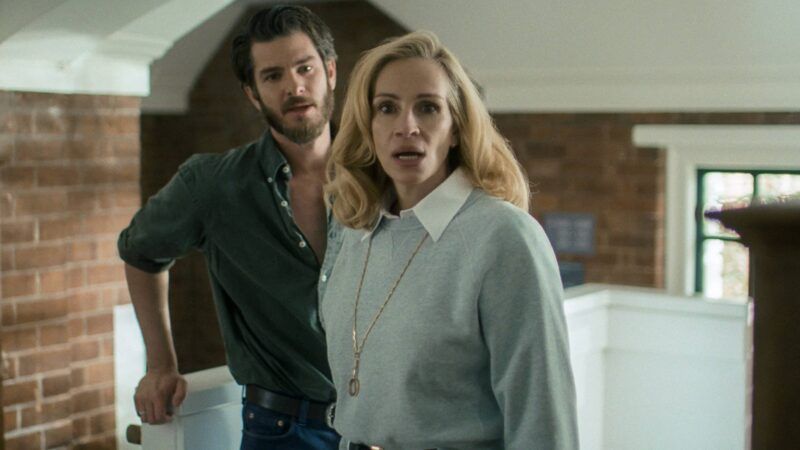Luca Guadagnino's After the Hunt Skewers #MeToo Moral Posing
A feisty, cancel-culture provocation that isn't willing to commit.

Luca Guadagnino's After the Hunt is a talky stew of post-#MeToo provocation. It's maddening, devilish, caustic, and occasionally quite funny in its shotgun-like satire of campus sex-and-status politics. The movie's strength lies in what it refuses to say, what it refuses to commit to, what it refuses to make easy—and its weaknesses lie in those same qualities.
Is this a critique of #MeToo, a schematically oblique both-sides cop-out, or something darker and more devious? The answer is yes. That's about the only answer the movie provides.
The setup is simple enough. At Yale University, Hank, a white, middle-aged male professor, is accused of sexual assault by Maggie, a Black, queer Ph.D. student. The details of the alleged assault are left unclear, but you can imagine he might have done it: he's arrogant, flirtatious, and he drinks too much. But he says the student is merely reacting to the fact that he confronted her about plagiarizing her dissertation. You can imagine, too, that this could be true: She responds to slightly out-of-bounds conversations with just-so politically correct comebacks. And when asked about her area of study, she has nothing of substance to say.
In the middle of all this is an older professor, on the cusp of making tenure, named Alma, played by Julia Roberts. Like Hank and Maggie, Alma is a philosopher—someone who studies the nature of ethics, virtue, and morality. And she is trapped in a moral quandary of her own: Maggie, an acolyte, first alleges the assault to her. But Alma is close with Hank, and Hank, insisting on his innocence, wants her to take his side.
Alma's decision is complicated by her own circumstances. She lives a well-to-do intellectual life in a catalog-worthy apartment with Frederick, her psychiatrist husband. Their picture-perfect marriage is more complicated than it seems, and the timing of Maggie's accusation complicates Alma's own tenuous standing in the department. What will she do?
One way to look at the movie is as a sneering satire of woke campus nonsense at the height of #MeToo. One of the film's producers, Brian Grazer, a longtime Democratic donor who voted for Donald Trump, has hinted that he sees it that way, telling The Hollywood Reporter, "Before this project existed, I was very much in the anti-woke category—it just got too extreme. And this movie shows the damage of that by dealing with false accusations on the Yale campus." To be clear, the movie never firmly establishes that Maggie's central allegations are false. But with its smirking sensibility and its diatribes against rich Ivy League students, it's easy enough to read the film as an anti-woke satire.
But you can just as easily read it as something grander and darker—a story about an elite system that is fundamentally broken, that elevates damaged people, and that selects primarily for individuals who are crafty in pursuing their own self-interest while pretending to be moral exemplars. Alma and Hank are philosophy professors; Maggie studies virtue ethics. The chairman of the department at one point speaks of how he has become an expert in symbolic public communication rather than substantive academic rigor. He displays a bottle of pricey but notoriously peaty, aggressive Laphroaig Scotch on a liquor cart to show he has elite taste—but what he really likes to drink is basic Jameson. The point is that nobody actually likes the elite stuff. They pretend to for status.
That's probably the strongest reading of the film. It depicts the ivory tower, and by implication elite spaces everywhere, as a mirror world of empty status signaling—in which no one really likes what they're doing, and no substantive intellectual work is being performed.
At its best, it captures the sheer, exhausting emptiness of elite status battles. But the movie's big idea is that in the ridiculous, self-serious elite status competitions that defined the woke era, there were no ideas—no concepts of morality, justice, or decency—no philosophies to speak of. Just defensive jargon and self-preserving chess moves by privileged, useless people seeking to preserve their useless privilege. The movie sometimes seems designed to prove its point by provoking those same people, by prodding them into a reaction that makes the case for it. Like I said: it's a provocation.
In that sense, it's frequently effective, with a serrated wit that provokes an evil chuckle or a knowing smirk. But its prodding and poking of cultural hot buttons can only go so far: What it doesn't provoke much of is genuine thought.


Show Comments (13)